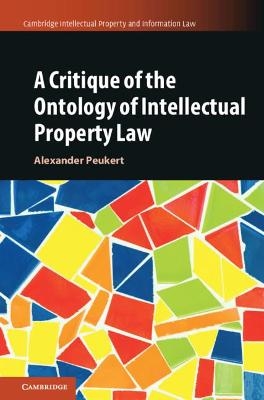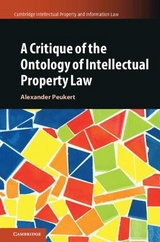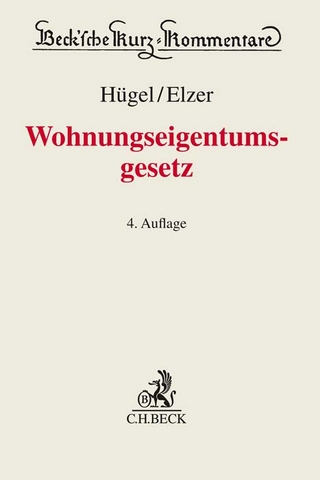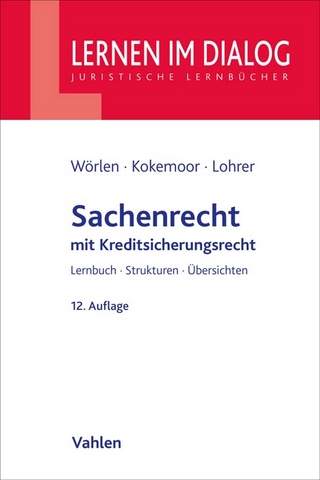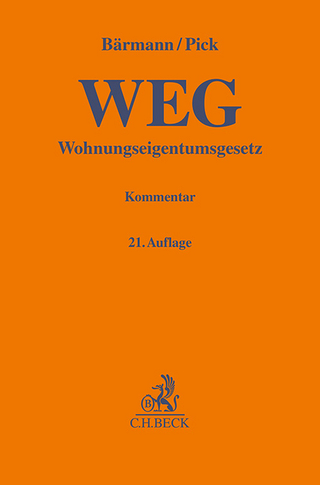A Critique of the Ontology of Intellectual Property Law
Seiten
2021
Cambridge University Press (Verlag)
978-1-108-49832-6 (ISBN)
Cambridge University Press (Verlag)
978-1-108-49832-6 (ISBN)
Alexander Peukert provides the first comprehensive critique of the idea that 'intellectual property' (IP) exists as an abstract object that can be owned. This book develops an alternative IP theory, according to which IP rights provide their holders with an exclusive privilege to use 'Master Artefacts'.
Intellectual property (IP) law operates with the ontological assumption that immaterial goods such as works, inventions, and designs exist, and that these abstract types can be owned like a piece of land. Alexander Peukert provides a comprehensive critique of this paradigm, showing that the abstract IP object is a speech-based construct, which first crystalised in the eighteenth century. He highlights the theoretical flaws of metaphysical object ontology and introduces John Searle's social ontology as a more plausible approach to the subject matter of IP. On this basis, he proposes an IP theory under which IP rights provide their holders with an exclusive privilege to use reproducible 'Master Artefacts.' Such a legal-realist IP theory, Peukert argues, is both descriptively and prescriptively superior to the prevailing paradigm of the abstract IP object. This work was originally published in German and was translated by Gill Mertens.
Intellectual property (IP) law operates with the ontological assumption that immaterial goods such as works, inventions, and designs exist, and that these abstract types can be owned like a piece of land. Alexander Peukert provides a comprehensive critique of this paradigm, showing that the abstract IP object is a speech-based construct, which first crystalised in the eighteenth century. He highlights the theoretical flaws of metaphysical object ontology and introduces John Searle's social ontology as a more plausible approach to the subject matter of IP. On this basis, he proposes an IP theory under which IP rights provide their holders with an exclusive privilege to use reproducible 'Master Artefacts.' Such a legal-realist IP theory, Peukert argues, is both descriptively and prescriptively superior to the prevailing paradigm of the abstract IP object. This work was originally published in German and was translated by Gill Mertens.
Alexander Peukert is Professor of civil law, intellectual property, and competition law at Goethe University, Frankfurt am Main/Germany. He has published five books and more than seventy articles in these fields, with a focus on the theoretical foundations of intellectual property law.
1. Introduction; 2. Two ontologies; 3. Two abstractions; 4. Interim summary: an implausible paradigm; 5. The legal explanatory power of the two ontologies; 6. Normative critique of the abstract IP object.
| Erscheinungsdatum | 17.05.2021 |
|---|---|
| Reihe/Serie | Cambridge Intellectual Property and Information Law |
| Übersetzer | Gill Mertens |
| Zusatzinfo | Worked examples or Exercises |
| Verlagsort | Cambridge |
| Sprache | englisch |
| Maße | 230 x 150 mm |
| Gewicht | 460 g |
| Themenwelt | Recht / Steuern ► Allgemeines / Lexika |
| Recht / Steuern ► EU / Internationales Recht | |
| Recht / Steuern ► Privatrecht / Bürgerliches Recht ► Sachenrecht | |
| Recht / Steuern ► Wirtschaftsrecht ► Urheberrecht | |
| ISBN-10 | 1-108-49832-9 / 1108498329 |
| ISBN-13 | 978-1-108-49832-6 / 9781108498326 |
| Zustand | Neuware |
| Informationen gemäß Produktsicherheitsverordnung (GPSR) | |
| Haben Sie eine Frage zum Produkt? |
Mehr entdecken
aus dem Bereich
aus dem Bereich
Gesetz über das Wohnungseigentum und das Dauerwohnrecht …
Buch | Hardcover (2025)
C.H.Beck (Verlag)
CHF 166,60
Gesetz über das Wohnungseigentum und das Dauerwohnrecht : Kommentar
Buch | Hardcover (2025)
C.H.Beck (Verlag)
CHF 124,60
